By Lucy Komisar
Truth and a bit of fantasy. A quite extraordinary play of how generations of an immigrant family create a major financial institution that starts as a southern cotton farming supply shop and ends as a multinational bank whose crash helps bring on the Great Recession of 2008.
It attempts to tell the story of western capitalism through the fortunes of this very industrious and far-sighted family. Unfortunately, the choice to present this as largely a family story misses the financial politics that would demonstrate that this is not just about three immigrant brothers from Germany and their progeny, but about the systemic corruption of the American and international financial system.
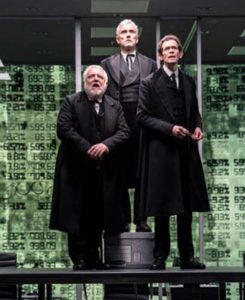
The play by the British writer Ben Power is based on a work by the Italian Stefano Massini and staged by the accomplished British director Sam Mendes. So, perhaps they are not grounded in U.S. financial history. And they particularly could not establish links between the corruption-fueled Depression and the collapse of the Lehman bank in 2008.
As a piece of theater, this is brilliant, fascinating. Mendes is a very fine director, and the cast is superb. The brothers and their sons down the line (where are the women?) are played powerfully by Simon Russell Beale, Adam Godley, and Ben Miles. Arriving in Alabama in the mid-1840s, they go from running a farming supplies shop to moving cotton to the north. Then they establish a bank.
We know that slavery was the economic foundation of the cotton south, and then of the financial system built on it. It was a building block of the American economy. The Lehmans in fact owned slaves. But this is not about slavery, which doesn‘t appear to raise any moral problems among the clan.
The next big flaw is the treatment of the 1929 crash, when we see the suicides of ten or more stock traders, each described in detail, but not a word about the Pecora Report, that famous investigation of the time which told how the men who ran Wall Street were corrupt manipulators who brought the system down.
The scenes occur in a brilliantly clever set of a rotating glass square by Es Devlin, with video of changing backdrops by Luke Halls. But I‘m an investigative journalist as well as a theater critic, and for me the story counts more than the visuals.
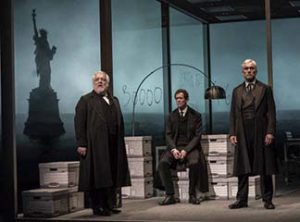
Henry Lehman, born 1822, had been dreaming of America. He makes the passage in 1844 and goes to Alabama. Of course, there was another passage to Alabama by people for whom his dream was a nightmare. His brothers Emanuel (Ben Miles) and Mayer (Adam Godley) arrive a few years later.
They move from dry goods to what is needed for growing cotton. There‘s a terrific drama of plantations on fire, the need for their services to rebuild — seeds, tools, to be paid for in raw cotton the Lehmans will resell up north.
The glass square turns as time goes on. Through the south, they are the middlemen, brokers. Brother Emanuel goes to New York where the real money works. A point is made of their Jewishness, but that mostly deals with business – they can’t get into some, they have an advantage in others.
Henry dies of yellow fever. The family continues, expands its business. We learn how Lehman Brothers Cotton moves to financing railroads and becomes Lehman Brothers Bank when the government of Alabama subsidizes it. It‘s now known as crony capitalism or socialism for the rich. The bank will move to Wall Street as industrialization puts down strong roots and will become an investment bank.
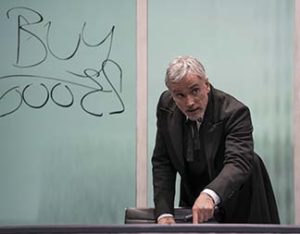
The glass office is gorgeous, now with a brown leather couch, corporate conference table, and file boxes that bespeak Germanic organization. The surrounding buildings get taller. Philip who takes over in 1887 wants to finance a Panama Canal. Wants to turn Lehman Bank into Lehman Finance, showing the financialization of the global banking system. A son Robert, who comes to the bank in 1925, goes to Yale and turns to Wall Street.
There are comic scenes with the wives (Adam Godley is good as the cartoonish women), but there are no real women‘s roles. The younger men have modern business school voices, but it‘s hard to tell them apart. And then the 1929 crash. People demand their money. Stock brokers and investors jump out of windows. Investment funds are at zero. Banks are closing. What if everyone stops believing?
The really admirable Lehman is Mayer‘s son Herbert, who leaves the firm. He becomes New York‘s governor 1933-47 and U.S. Senator 1949-57. He says, “Grabbing and greed can go on for just so long, but the breaking point is bound to come sometime.”
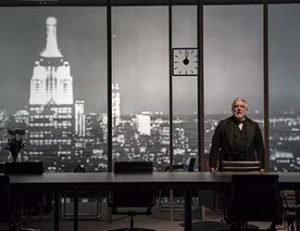
But the Lehmans and the firm don’t stop believing, or find it useful to believe, and the author doesn‘t mention the Pecora investigation that exposes internal market corruption. Time moves to the near present. A Lehman, Robert, will run the bank for the last time, till 1969.
Pete Peterson, who had been Richard Nixon‘s commerce secretary, takes the top job. Then he is bought out by American Express and uses the cash to fund a neoliberal Washington think tank, paying for a new focus: the need to privatize Social Security. Dick Fuld takes over Lehman. And comes the 2008 crash. Hank Paulson, the Treasury head who had come from Goldman Sachs, bails out Goldman but refuses Lehman. No honor among thieves: it‘s insider corruption.
The play focuses on the building of a financial empire. Adapter Ben Power writes that through the family and “the hubristic tragedy of 2008” we can see “where we are and how we got there.”
The personal stories and the fine acting link events together, but not well enough to inform anyone in the audience who already doesn‘t know “how we got there.” The missing story is how the Lehman empire and others like it crash the world financial system, destroy lives, the story of the corrupt financialization and government cronyism benefiting favored banks and squashing others.
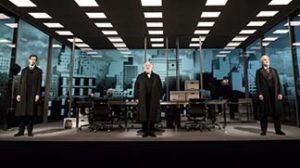
Not to mention the government‘s failure to act to protect 7 million Americans who lose their homes as the result of banks‘ corrupt mortgage operations, so brazen that they include “losing” documents that show people paid off their mortgages and going to court to foreclose on their homes. Or the millions who lose jobs.
Ironically, Lehman Brothers Finance is destroyed itself. The real dénouement is how Lehman‘s competitors with better political connections use their control of big governments to bail themselves out and continue as financial predators.
“The Lehman Trilogy.” Written by Stefano Massini, adapted by Ben Power, directed by Sam Mendes. Produced by the National Theatre and Neal Street Productions, in collaboration with Park Avenue Armory. (212) 933-5812. Opened March 22, closes April 20, 2019. Running time 3:20. $45 rush tickets on day of performance at the Box Office beginning 12pm (two per person). 4/13/19.

